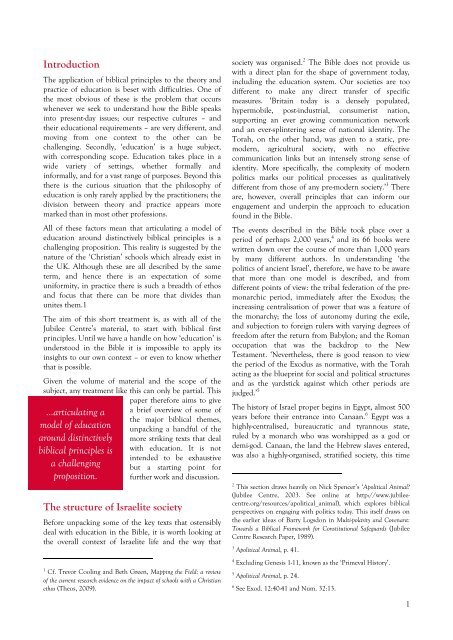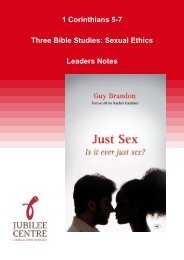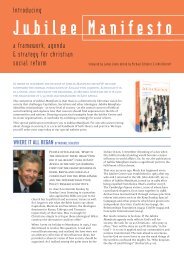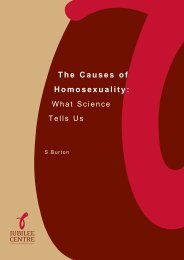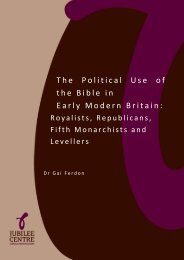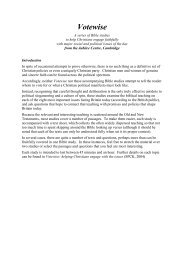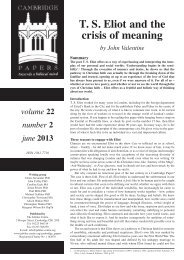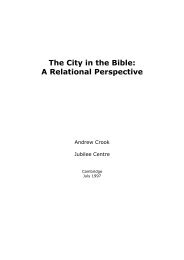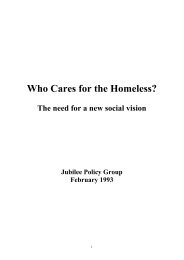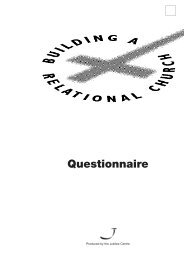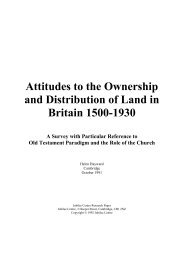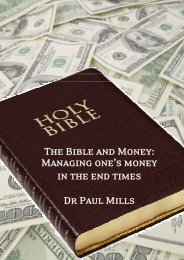Education in the Bible - Jubilee Centre
Education in the Bible - Jubilee Centre
Education in the Bible - Jubilee Centre
Create successful ePaper yourself
Turn your PDF publications into a flip-book with our unique Google optimized e-Paper software.
Introduction<br />
The application of biblical pr<strong>in</strong>ciples to <strong>the</strong> <strong>the</strong>ory and<br />
practice of education is beset with difficulties. One of<br />
<strong>the</strong> most obvious of <strong>the</strong>se is <strong>the</strong> problem that occurs<br />
whenever we seek to understand how <strong>the</strong> <strong>Bible</strong> speaks<br />
<strong>in</strong>to present-day issues; our respective cultures – and<br />
<strong>the</strong>ir educational requirements – are very different, and<br />
mov<strong>in</strong>g from one context to <strong>the</strong> o<strong>the</strong>r can be<br />
challeng<strong>in</strong>g. Secondly, ‘education’ is a huge subject,<br />
with correspond<strong>in</strong>g scope. <strong>Education</strong> takes place <strong>in</strong> a<br />
wide variety of sett<strong>in</strong>gs, whe<strong>the</strong>r formally and<br />
<strong>in</strong>formally, and for a vast range of purposes. Beyond this<br />
<strong>the</strong>re is <strong>the</strong> curious situation that <strong>the</strong> philosophy of<br />
education is only rarely applied by <strong>the</strong> practitioners; <strong>the</strong><br />
division between <strong>the</strong>ory and practice appears more<br />
marked than <strong>in</strong> most o<strong>the</strong>r professions.<br />
All of <strong>the</strong>se factors mean that articulat<strong>in</strong>g a model of<br />
education around dist<strong>in</strong>ctively biblical pr<strong>in</strong>ciples is a<br />
challeng<strong>in</strong>g proposition. This reality is suggested by <strong>the</strong><br />
nature of <strong>the</strong> ‘Christian’ schools which already exist <strong>in</strong><br />
<strong>the</strong> UK. Although <strong>the</strong>se are all described by <strong>the</strong> same<br />
term, and hence <strong>the</strong>re is an expectation of some<br />
uniformity, <strong>in</strong> practice <strong>the</strong>re is such a breadth of ethos<br />
and focus that <strong>the</strong>re can be more that divides than<br />
unites <strong>the</strong>m.1<br />
The aim of this short treatment is, as with all of <strong>the</strong><br />
<strong>Jubilee</strong> <strong>Centre</strong>’s material, to start with biblical first<br />
pr<strong>in</strong>ciples. Until we have a handle on how ‘education’ is<br />
understood <strong>in</strong> <strong>the</strong> <strong>Bible</strong> it is impossible to apply its<br />
<strong>in</strong>sights to our own context – or even to know whe<strong>the</strong>r<br />
that is possible.<br />
Given <strong>the</strong> volume of material and <strong>the</strong> scope of <strong>the</strong><br />
subject, any treatment like this can only be partial. This<br />
paper <strong>the</strong>refore aims to give<br />
…articulat<strong>in</strong>g a<br />
model of education<br />
around dist<strong>in</strong>ctively<br />
biblical pr<strong>in</strong>ciples is<br />
a challeng<strong>in</strong>g<br />
proposition.<br />
a brief overview of some of<br />
<strong>the</strong> major biblical <strong>the</strong>mes,<br />
unpack<strong>in</strong>g a handful of <strong>the</strong><br />
more strik<strong>in</strong>g texts that deal<br />
with education. It is not<br />
<strong>in</strong>tended to be exhaustive<br />
but a start<strong>in</strong>g po<strong>in</strong>t for<br />
fur<strong>the</strong>r work and discussion.<br />
The structure of Israelite society<br />
Before unpack<strong>in</strong>g some of <strong>the</strong> key texts that ostensibly<br />
deal with education <strong>in</strong> <strong>the</strong> <strong>Bible</strong>, it is worth look<strong>in</strong>g at<br />
<strong>the</strong> overall context of Israelite life and <strong>the</strong> way that<br />
1<br />
Cf. Trevor Cool<strong>in</strong>g and Beth Green, Mapp<strong>in</strong>g <strong>the</strong> Field: a review<br />
of <strong>the</strong> current research evidence on <strong>the</strong> impact of schools with a Christian<br />
ethos (Theos, 2009).<br />
society was organised. 2 The <strong>Bible</strong> does not provide us<br />
with a direct plan for <strong>the</strong> shape of government today,<br />
<strong>in</strong>clud<strong>in</strong>g <strong>the</strong> education system. Our societies are too<br />
different to make any direct transfer of specific<br />
measures. ‘Brita<strong>in</strong> today is a densely populated,<br />
hypermobile, post-<strong>in</strong>dustrial, consumerist nation,<br />
support<strong>in</strong>g an ever grow<strong>in</strong>g communication network<br />
and an ever-spl<strong>in</strong>ter<strong>in</strong>g sense of national identity. The<br />
Torah, on <strong>the</strong> o<strong>the</strong>r hand, was given to a static, premodern,<br />
agricultural society, with no effective<br />
communication l<strong>in</strong>ks but an <strong>in</strong>tensely strong sense of<br />
identity. More specifically, <strong>the</strong> complexity of modern<br />
politics marks our political processes as qualitatively<br />
different from those of any pre-modern society.’ 3 There<br />
are, however, overall pr<strong>in</strong>ciples that can <strong>in</strong>form our<br />
engagement and underp<strong>in</strong> <strong>the</strong> approach to education<br />
found <strong>in</strong> <strong>the</strong> <strong>Bible</strong>.<br />
The events described <strong>in</strong> <strong>the</strong> <strong>Bible</strong> took place over a<br />
period of perhaps 2,000 years, 4 and its 66 books were<br />
written down over <strong>the</strong> course of more than 1,000 years<br />
by many different authors. In understand<strong>in</strong>g ‘<strong>the</strong><br />
politics of ancient Israel’, <strong>the</strong>refore, we have to be aware<br />
that more than one model is described, and from<br />
different po<strong>in</strong>ts of view: <strong>the</strong> tribal federation of <strong>the</strong> premonarchic<br />
period, immediately after <strong>the</strong> Exodus; <strong>the</strong><br />
<strong>in</strong>creas<strong>in</strong>g centralisation of power that was a feature of<br />
<strong>the</strong> monarchy; <strong>the</strong> loss of autonomy dur<strong>in</strong>g <strong>the</strong> exile,<br />
and subjection to foreign rulers with vary<strong>in</strong>g degrees of<br />
freedom after <strong>the</strong> return from Babylon; and <strong>the</strong> Roman<br />
occupation that was <strong>the</strong> backdrop to <strong>the</strong> New<br />
Testament. ‘Never<strong>the</strong>less, <strong>the</strong>re is good reason to view<br />
<strong>the</strong> period of <strong>the</strong> Exodus as normative, with <strong>the</strong> Torah<br />
act<strong>in</strong>g as <strong>the</strong> bluepr<strong>in</strong>t for social and political structures<br />
and as <strong>the</strong> yardstick aga<strong>in</strong>st which o<strong>the</strong>r periods are<br />
judged.’ 5<br />
The history of Israel proper beg<strong>in</strong>s <strong>in</strong> Egypt, almost 500<br />
years before <strong>the</strong>ir entrance <strong>in</strong>to Canaan. 6 Egypt was a<br />
highly-centralised, bureaucratic and tyrannous state,<br />
ruled by a monarch who was worshipped as a god or<br />
demi-god. Canaan, <strong>the</strong> land <strong>the</strong> Hebrew slaves entered,<br />
was also a highly-organised, stratified society, this time<br />
2<br />
This section draws heavily on Nick Spencer’s ‘Apolitical Animal?<br />
(<strong>Jubilee</strong> <strong>Centre</strong>, 2003. See onl<strong>in</strong>e at http://www.jubileecentre.org/resources/apolitical_animal),<br />
which explores biblical<br />
perspectives on engag<strong>in</strong>g with politics today. This itself draws on<br />
<strong>the</strong> earlier ideas of Barry Logsdon <strong>in</strong> Multi-polarity and Covenant:<br />
Towards a Biblical Framework for Constitutional Safeguards (<strong>Jubilee</strong><br />
<strong>Centre</strong> Research Paper, 1989).<br />
3<br />
Apolitical Animal, p. 41.<br />
4<br />
Exclud<strong>in</strong>g Genesis 1-11, known as <strong>the</strong> ‘Primeval History’.<br />
5<br />
Apolitical Animal, p. 24.<br />
6<br />
See Exod. 12:40-41 and Num. 32:13.<br />
1


